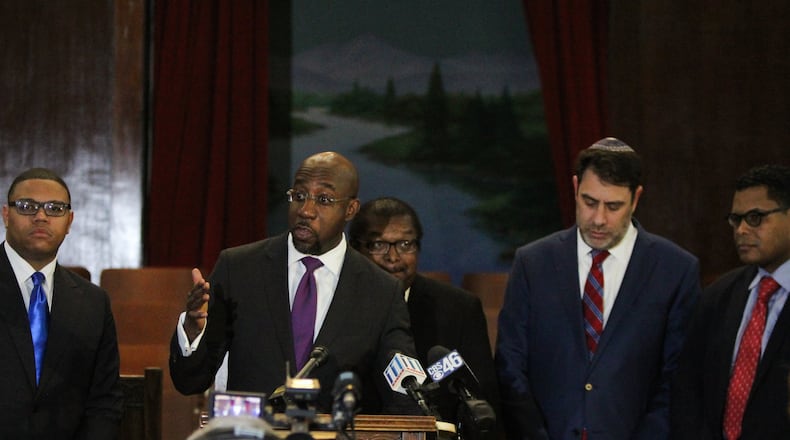AME Bishop Reginald T. Jackson spent four years working in Zimbabwe, Malawi, Tanzania and Uganda.
He got to know the people there and their desire to work hard to better their lives.
It was a relationship built on years of mutual respect.
Now he worries that relationship could be strained after President Trump reportedly referred to several African nations and Haiti as “shithole countries” during a White House meeting about immigration, then questioned why the United States didn’t welcome more people from places like Norway instead.
Friday, the president denied making the vulgar comment, but acknowledged that he used “tough” language. Dick Durbin, the second-ranking Democrat in the Senate, disputed that claim.
In a world where the United States still battles the image of the “Ugly American,” Trump’s alleged comment do little to change that view.
“I think it’s going to create resentment because the inference is these countries are poor and their citizens don’t have anything to offer,” said Jackson. “He’s an embarrassment around the world.”
Thomas Kemper, general secretary of the General Board of Global Ministries of the United Methodist Church, is concerned.
“His statement erodes trust in the United States in general and makes life and work in dangerous and volatile areas even more difficult,” he said.
It’s also not lost on many that the comments attributed to Trump came just ahead of the eighth anniversary of the catastrophic earthquake that leveled a large swath of Haiti, killing hundreds of thousands of people and displacing many more. Or that it came just days before the birthday observance of the Rev. Martin Luther King Jr.
“Truly great nations don’t demean the poor,” said Bishop Robert Wright of the Episcopal Diocese of Atlanta. He said Trump’s comments make the work more complicated. “They extend the perception that Americans are rude and arrogant. The comments make it difficult for other places in the world to see us as a nation of compassion.”
Jackson said his Haitian friends are stunned that “someone with this mindset is president of the United States.”
“Those words were terribly insulting to me,” said Jackson, who leads the AME’s Sixth District, which includes Georgia. He said he received several calls from friends in Africa asking why the U.S. president “dislikes us so. I told them it’s not you, it’s him.”
Other Atlanta faith leaders on Friday also blasted Trump and said it could make their mission work and church plantings more difficult, although most people in those nations seem to know it’s coming from Trump and not the American people.
Wright said he takes Trump’s words personally. He said many congregations have traveled to Haiti for aid work or support efforts there.
“We have dollars, and prayers and sweat invest in this shithole,” he said.
Wright added that he plans to call Sen. David Perdue, who was in that same meeting with Trump, but says he doesn’t recall that remark.
“I’m going to call on Sen. Perdue to denounce those comments today. That’s not what Georgians stand for.”
“That shithole he’s talking about is our church,” Wright said. “He’s talking about God’s people, and he’s talking about our family.”
Related: Perdue: I don't recall Trump's controversial comment on Haiti
The Rev. Raphael G. Warnock, of Ebenezer’s Baptist Church, has traveled to Haiti and several African nations.
“The president of the United States has polluted the atmosphere once again with some of the most vile and racist remarks that one can imagine, disparaging the wonderful people of Haiti and the entire African continent,” said Warnock. “His remarks are unpresidential, undignified and uncivilized.”
He noted that Trump spent part of the morning in a signing ceremony honoring King. “My response to that is, ‘Mr. President, we don’t need a proclamation right now. What we need is an apology. … A proclamation without an apology is hypocrisy.”
He said Trump continues to promote racist and xenophobic policies. “He’s condemned virtually every group in this country except the Ku Klux Klan and the neo-Nazis.”
Related: Steep decline in Trump's approval rating in Georgia
Related: Out of the president's heart, the mouth speaks
It’s not just faith leaders who are upset.
Georgia-based nonprofits, such as CARE, do extensive work in Haiti and more than 30 nations in Africa.
Michelle Nunn, president and CEO, began her day with an early morning email from Tatiana Bertolucci, CARE’s regional director for Latin America and the Caribbean.
“CARE has been working in Haiti for more than 60 years,” Bertolucci wrote. “We were there before the earthquake. We were there during it, and we are there now side by side with the Haitian people to shape a different future. In my opinion, we should state our support to Haiti today. That is also the eighth anniversary of the earthquake. I think we need to send a strong message to our team in Haiti.”
CARE has 375 staff members in Haiti.
“This has a tremendous impact on the reputation of the United States and the understanding of people around the world of the values we represent and our leadership,” she said. “It’s a fundamental repudiation of our nation’s foundation of equality and dignity for all people.”
She said mutual respect and compassion are cornerstones of the work that CARE does around the world. On Friday, CARE turned to social media to showcase stories that highlight the dignity and resilience of Haitians and Africans.
“It calls into question the spirit of partnership that America brings, the spirit of respect for other countries, and the spirit of empathy and compassion.”
About the Author
Keep Reading
The Latest
Featured


